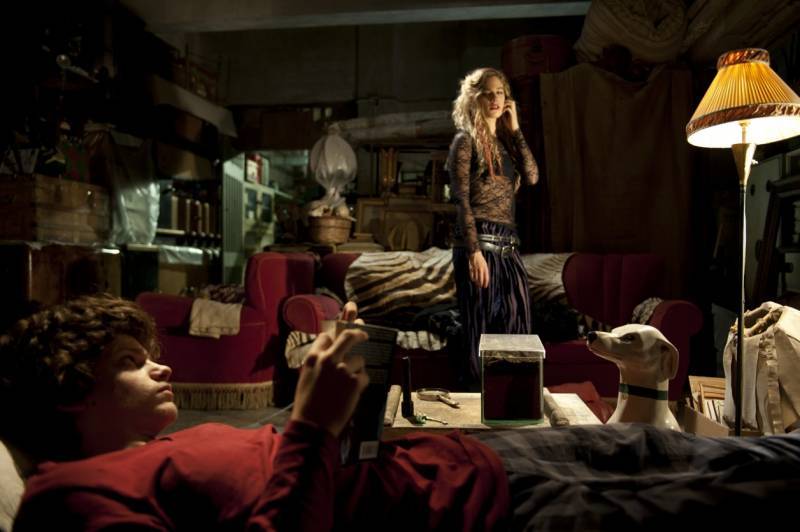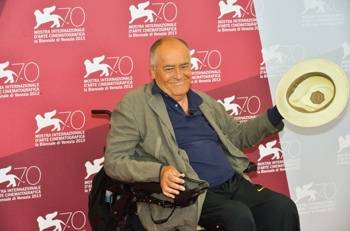Ammaniti & Bertolucci: Adapting Novels into Films
Me and You, Io e Te, is a film about the turmoil of adolescence. 14-year-old Lorenzo (played by Jacopo Olmo Antinori) is a shy outcast. He fakes his departure for a school trip and decides to spend a week holed up alone in the basement of the family’s apartment building. He’s in the company of music, books, and an ant farm.
His Garden of Eden is then invaded by his heroin-addicted older half-sister Olivia (played by Tea Falco).
She needs a place where she can hide from drugs and to go cold turkey. the two grow closer and make a mutual pact that they will stop hiding: Olivia will stop looking for refuge in drugs and Lorenzo will stop hiding from the world.
Me and You, Io e Te, is a film from 2012 by Bernardo Bertolucci, his last one for now.
The film, based in the novel by the same title by Niccolò Ammaniti, was screened at Casa Italiana Zerilli-Marimò as part of The New Literature from Europe Festival “an annual celebration of writing from across the European continent, featuring readings and discussions between leading and emerging literary voices from Europe.” Among this year’s representative there was Roman writer Niccolò Ammaniti.
Ammaniti is an award winning, prolific author whose novels are often turned into internationally successful films, including Me and You. This was the first film directed by Bertolucci since 2003, and the first directed after being bound to his wheelchair.
After a screening of the film, Ammaniti was interviewed by Stefano Albertini, director of Casa Italiana, and professor and writer Antonio Monda.
“When I met Bertolucci he hadn’t made films for a while, years… because he was looking for a film that was right for him. I met him briefly at the time of I’m not Scared, because it seemed he was interested in making it into a film.
Yet he was busy with some other project so we just stayed in touch. I thought this would be the right story for him especially because he was in a wheelchair. I sent him the book and he was interested right away but he needed to find the right location. A basement. He related to the story, as when he was a child he also sought refuge in a basement, so he immediately asked me to work on the film. As far as the basement is concerned, the basement we see in the film was basically built next to his home, so it was easily accessible to him and he could easily go to work.”
Despite the fact that Bertolucci thought that the main character was based on Ammaniti himself, he immediately grasped the story and filled the blank spots of the story with his imagination. In Ammaniti’s words, “The literary experience is made 50% by the author and 50% by the readers who fills spaces with their own personal experiences. I think this is unique and only literature can do that.” Bertolucci had been one of the readers and was about to become the cinematic translator of the story.
“As an author, I believe that it is interesting when someone takes your story and and “translates” it into his own language, wether cinematographic or not. This process is not easy though and I believe the best films are the ones that somehow betray the original story. Apocalypse Now comes from a book, (Francis Ford Coppola's film is based on Heart of Darkness but set in the jungles of Vietnam.
The novel, instead, is set in the heart of Africa) but the written and the cinematic stories are very different, even the setting is different. That was one of the best betrayals ever in the history of cinema. When we worked on I Am not Scared with Gabriele Salvatores he asked me where we should set the film and I told him “between Puglia and Basilicata.” The novel is set in a fictitious town called Acqua Traverse. He went looking for the right place, he found it and he was able to satisfy my imagination completely. It was exactly what I had in mind. He did not betray my imagination.”
As readers, it often happens that when we see a film and then read the book, and not necessarily in that order, we realize soothing is off. We feel that the book was violated by the film. We feel that our experience was spoiled because what we see is different from what we imagined. And that is how many readers of the novel felt when they saw Io e Te. The endings are different.
“In the book the end is sudden,” Ammaniti explained, “while the film ends with the two siblings separating and each one goes their way. It’s more open ended, yet literature per se is more open ended than cinema. When you write a sentence it is not as definite as when you see an image, and a very sad or pessimistic image at the end of a film might somehow change your perception of everything you have seen up to that point. In the book the story is told by the protagonist when he is an adult. That implied working on him, having him age and recall past events, and I don’t like to see an adult version of a character tell his story through flashbacks.
We tried to write an ending that was more similar to the one in the book , we worked on it for months but we were never happy with it. We sort of found one but we already knew it would not work. Bertolucci showed me a pre-edited version of the film and we realized that the ending was already there, so we didn’t have to shoot anymore.”
Ammaniti has just released a new book, Anna, a novel with a dark vision of life. Will it become a film too? At the moment we don’t know but why wait for a director to give us his vision? Readers can see their own images, in their mind as they read.








































i-Italy
Facebook
Google+
This work may not be reproduced, in whole or in part, without prior written permission.
Questo lavoro non può essere riprodotto, in tutto o in parte, senza permesso scritto.